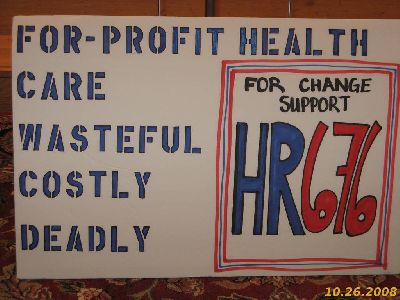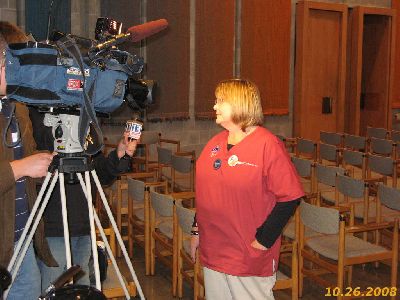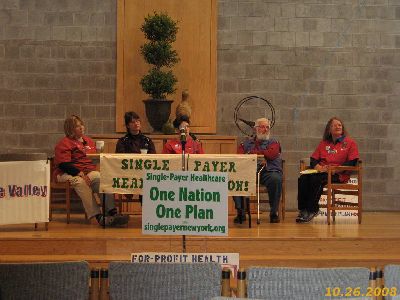Health Care Conferences come to Rochester
Primary tabs



Rochester was host to two conferences on health care recently. On October 21 a panel discussion was held at Cavalry Presbyterian Church. All of the current State and National political candidates and office holders were invited, but only New York State Senate candidates Richard Dollinger and David Nachbar attended. The conference was presided over by Dr. Laurence Jacobs of Physicians For A National Health Care Program. The following Sunday, October 26, the Drive to Health Care Voters Tour made stops at the Veteran's Outreach Center and the First Unitarian Church. It featured Donna Smith, from Michael Moore's film Sicko.
The US health care system is dysfunctional to the point of crisis. Although it offers some of the highest medical technology, access to that care is uneven. It has even been described by some as “medical apartheid.†How did we get into this mess? The US is the only country where health care is treated as a commodity, a privilege, even a luxury. By contrast all other developed countries as well as many developing and undeveloped countries treat health care as a basic human right. Health care in the US has been traditionally funded by employers. This began during World War II when employers were forbidden by anti-profiteering laws from raising workers' pay. As an incentive to keep good employees, they began offering health care benefits. This worked well for a while but later put US manufacturers at a disadvantage when they had to start competing against producers in other countries who were not burdened with employee health care costs.
The current for-profit health care system leads to destructive behavior. Insurance companies driven by profit try to insure only healthy people. There is an overabundance of specialists and high-tech equipment, but a severe shortage of primary-care physicians and nurses. Patients without insurance often defer attention to minor maladies until they become severe and more expensive to treat. High-cost does not equate to high-quality. 47 million Americans have no health insurance. 18,000 to 22,000 die each year because of no or inadequate health care. Health care resources are allocated by ability to pay, not medical need or chance for recovery. The US has the lowest lifespan and highest infant mortality of any industrialized country. Those statistics are worsening, especially in the Southern states. Yet Americans pay 40 percent more for health care than anyone else in the world.
A solution has been proposed, in the form of The United States National Health Insurance Act, HR 676, sponsored by Rep John Conyers D-Michigan and Rep Dennis Kucinich D-Ohio. This bill would expand what we currently know as Medicare, to all Americans. Many are concerned about the cost of such a program. Would it cost us more? Perhaps not. We are already spending 1 out of every 6 dollars of our Gross Domestic Product on health care. 31 cents out of each of those dollars goes to the insurance industry. Only 69 cents actually go to health care. By contrast, 97 percent of Medicare dollars go to providing patient care. In countries such as Canada, France and the UK, 93 to 95 percent is spent on care. We are currently spending at least $12 billion a month on the war in Iraq. At least, because much of the spending is “off-budget.†We don't actually know how much the Bush Administration is really spending. What is spent on the Iraq war in two months could insure everyone for a year.
Some candidates have suggested a tax deduction to pay for insurance. This has too many flaws. It does not stop the siphoning off of money by insurance company stockholders and executives. The proposed refund amount of $5000 is less than half the cost of private insurance for a family. It makes no provision for those who don't earn enough to owe $5000 in taxes in the first place. The only true solution is a Universal, Single-Payer system. This is an important distinction. We currently, at least in New York, have universal auto insurance. All it does is force drivers to buy private insurance at whatever cost. Of course those who cannot pay it can always choose not to own a car. But we can't choose not to get sick. Single-Payer, as described in HR 676, is essential.
A frightening piece of industry propaganda was debunked at the conference on Sunday at the Unitarian Church. An audience member asked the following question: An 84 year old family member recently had to go on dialysis. It's a good thing he doesn't live in Canada, or he'd just be left to die because they have to ration health care.†Dr Leon Zoghlin, representing Physicians for National Health Policy responded. Many factors would be considered in making such a decision, such as the patient's quality of life, chances of recovery, and responsiveness to the treatment. But the decision would be made by doctors, not government regulators and not a profit-driven insurance company. However, under the current US system the decision would be based almost solely on the ability of that patient to pay. A comatose rich person with insurance might get the treatment, while an otherwise healthy person who couldn't pay would go without. A woman in the audience then spoke up, identifying herself as a British subject. “Margaret Thatcher gutted our health care but we'd never accept a system such as you have in the US.†She then added that she lived in Canada for several years. “When I hear the US media talking about the Canadian Medicare (as they call it) I ask myself what country are they talking about?â€
This matter has a personal note. I was the person in the audience who asked the question. The dialysis patient in question is an uncle of my brother's wife. He is otherwise healthy, lives with his wife, drives his car, plays golf and goes dancing. He had a good union job with the same company, an electronics manufacturer, for 35 years, and has good insurance. He would have been acceptable for dialysis under the Canadian, British and US systems, although by different reasoning. But that company no longer manufactures electronics in the US. What about his kids? What happens when one of them needs dialysis at age 84? We need HR 676 and we need it now. Tell your Representatives, your Senators and the President-elect.









